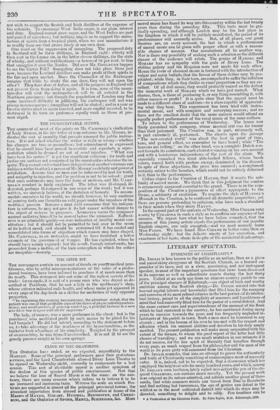CLOSE OF THE ORATORIOS.
-THE Oratorios have ended, as we expected, unprofitably to the Manager. Some of the principal performers gave their gratuitous services, and the' Lord Chamberlain allowed Drury Lane Theatre to be opened on Wednesday night, avowedly to compensate for a bad season. This sort of charitable appeal is another symptom of the decline of this species of public entertainment. Not that we believe the love of Sacred Music is on the wane: on the con- trary, there are many reasons which induce us to believe it to be an increased and increasing taste. Witness the scale on which Fes- tivals are supported in almost all the principal provincial towns; the abundant importation from abroad and publication at home of the . Masses of HAYDN, MOZART, HUMMEL, BEETHOVEN, and CHERIP. sun; and the .Oratorios of SPORE, MEHUL, SCRNEIDEE, &e. More sacred music has found its way into this country within the last twenty years than during the preceding fifty. This taste must be gra- dually spreading, and although London may be the last place in the kingdom in which it will be publicly manifested, the period of its predominance will assuredly arrive. But, of all places, our great theatres are, on every account, the last in which a performance of sacred music can be given with proper effect or with a reason- able chance of success. Our associations all lie another way. Nor is there any possibility of making such a selection as the different classes of the audience will relish. The genius of HANDEL and MOZART has no sympathy with the gods of Drury Lane. The shilling gallery and the Requiem were not made for each other, Hence the lover of classical music is tortured with the introduction of vulgar and noisy ballads, that the favour of these deities may be pro- pitiated; while they, in their turn, are compelled to suffer the infliction of compositions which they dislike in exact proportion as they are ex- cellent. Of all dull music, they would probably regard as the dullest the immortal work of MOZART which we have just named. What chance, then; is there of producing it, or any thing resembling it, with either success or profit? It is quite clear that the appeal must be made to a different class of auditors—to a class capable of appreciat- ing what they hear. This experiment has been tried with instru- mental music, and with complete and unvarying success ; and we have not the smallest doubt that the same success would attend an equally perfect performance of the vocal music of the same authors. To return to the performance of Wednesday. The house was thinly garnished with company, whose musical zest was far keener than their judgment. The Creation was, in part, extremely well, in part extremely ill, performed. The chorus upon the passage "The new-created world" was about the best in point of time, tune, and general effect, we remember to have heard; while "The heavens are telling," on the other hand, was a complete Dutch con- cert towards its conclusion, each chorister singing on his own account and with a boisterous independence of the rest of the choir. We especially remarked two stout able-bodied fellows, whose harsh voices, roared forth with profuse energy, dominated in the discord. In spite of these objections, the piece was encored; a compliment certainly rather to the beauties, which could not be entirely deformed in it, than to the performance. Critics object to the Creation of HAYDN, that it wants the sub- limity of sacred music. We think that in this judgment the sombre is erroneously supposed essential to the grand. There is in the com- position of the Creation a joyousness of effect appropriate to the theme, a sublimity of exultation. To require the style of HANDEL'S Messiah in the Creation, is to confound all dramatic proprieties • yet there are persons pretending to criticism, who have such a standard in their minds when they decry HAYDN. In the second part of the oratorio of Wednesday, Miss CRUDE sung a song by CIMAROSA in such a style as to confirm our auguries of her success. We repeat here what we have before remarked, that the promise of this young artiste excels the performance of our popular English singers, one only excepted,—and we need scarcely name Miss PATON. We have heard Miss CHILDE in better voice than on Wednesday night ; but the delicate nicety of her execution, and exactness of her taste, shone in despite of the accidental disadvantage.


















 Previous page
Previous page